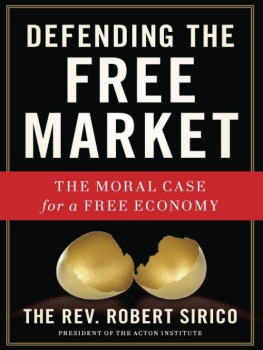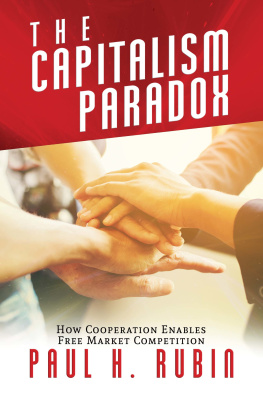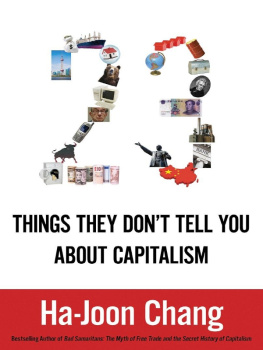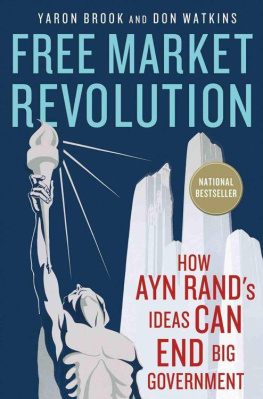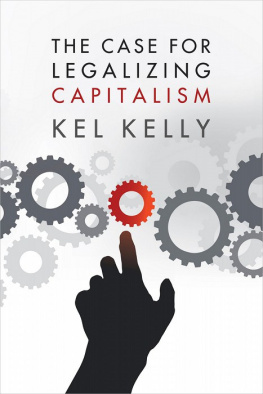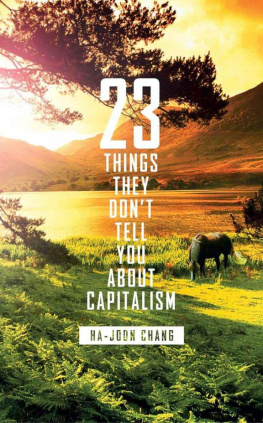Table of Contents
PRAISE FOR DEFENDING THE FREE MARKET
Ive been eagerly anticipating such a book from Father Sirico for a long time. The man has delivered magnificently. Defending the Free Market does more than the title suggests. It celebrates the miracle of freedom and points a lost generation back to the free and virtuous society.
Lawrence Kudlow,
anchor of CNBCs The Kudlow Report
Father Robert Sirico is a voice who must be heard. Defending the Free Market provides a solidly Christian perspective on capitalism and free marketsand makes the compelling case that we cannot possibly understand economics and how markets function without understanding the true nature of man.
Chuck Colson,
founder of Prison Fellowship and
the Colson Center for Christian Worldview
Defending the Free Market addresses the morality of entrepreneurship from the point of view of a sophisticated economist who is also an inspiring theologian, leading us on a journey to the free and virtuous society, animated by human creativity in the image of the Creator.
George Gilder,
author of Wealth and Poverty
As Father Sirico so rightly points out, no other system in history has lifted more people out of abject poverty than capitalism, but capitalism without a moral compass leads to a system and a society lost in the wilderness. Defending the Free Market reminds us of the moral responsibility of freedom and provides the perspective to see beyond our immediate goals and desires into the type of future we envision for our children and our nation.
Dave Van Andel,
chairman and CEO of the Van Andel Institute
If you think something in our world is distracted, disordered, out of joint, read Father Robert Siricos new book. It is well worth the journey.
William E. LaMothe,
retired chairman and CEO of Kellogg Company
Refreshing, uplifting, and encouraging, Father Robert Sirico understands how human beings can succeed in life, both economically and spiritually, and offers clear answers to the arguments against peoples ability to take destiny into their own hands. Defending the Free Market is required reading for the current and next generation of leaders.
Dr. Juan Jose Daboub,
former managing director of the World Bank
Father Robert Sirico is an evangelist for freedom. For more than twenty years he has persuasively explained the value of economic freedom in helping the poor become productive, creative, and virtuous. And he has expanded the free exchange of economic ideas in theological circles, demonstrating that the Christian tradition and economic ideas can enrich each other. This book advances that important argument.
Father Raymond J. de Souza,
columnist for Canadas National Post
My brother, Father Robert, says what he means and means what he says. This is a wonderful book!
Tony Sirico,
film and television actor who played Paulie Gualtieri on The Sopranos
Father Siricos Acton Institute has helped change the way peoples around the world think of liberty. And the opening passages in his new book grab your attention and dont let go. The rest of the book keeps the promise made in the beginning. His explanations for key terms are unusually clear. The central word in his text is UNLESS...
Michael Novak,
former U.S. ambassador to the U.N. Human Rights Commission
Every American concerned about our economy and the erosion of individual liberty should read Father Siricos insightful and well-reasoned book. As he makes crystal clear, our prosperity will continue to be provided not by government but through the proven power of the economic and personal freedoms we enjoy within American free enterprise.
Rich DeVos,
co-founder of Amway and chairman of the Orlando Magic
For
Kris Alan Mauren
Sirach 6:1417
INTRODUCTION
The End of Freedom?
H ave you ever seen a photograph of the earth at night? Lights are scattered across the globe, wherever human beings live and work and prosper. But there is a strange blank shape at the top of the Korean peninsula, all the more remarkable because the lower half of the peninsula, South Korea, is a blaze of luminosity. The dark patch above it is socialist North Korea, where the people live in such desperate poverty that their country is dark at night. The one tiny point of light is Pyongyang, where party elites enjoy the fruits of the miserable labor of the North Korean people, who are essentially slaves. Otherwise, North Korea is simply dark.
The illuminated lower half of the peninsula offers us a vision of what the world looks like with freedomthe freedom to create, prosper, and, as is so obvious, even to illuminate. But you also have in that photograph an image of what the world might look like were the torch of human liberty to sputter out, casting civilization into darkness.
Surely, some will say, the possibility is only alarmist rhetoric. Surely things will go on as they ever have. Has it not been always thus?
In response to that question I would merely point to human history. The lesson is plain. Civilizations fail. The reason they fail is also plain. When civilizational virtues are eroded from within, people lose the capacity to defend the good things those habits enabled previous generations to achieve. Think of ancient Greece; or the Roman Empire; or Germany in the 1930s. There are many other examples.
We need to look around us. Aside from the two world wars, the current global debt level is unprecedented. When one generation borrows more than the next generation can ever expect to repay, a society eventually reaches a tipping point.
And consider the demographic winter that is rapidly descending on Europe. Have Europeans lost hope and are therefore losing the desire to have children? Or has raising children simply become too much of a bother for a culture increasingly interested in the pleasures of the moment? In either case, the consequences are heavy. All the talk of a pension plan crisis in Europe masks what is really a moral crisis: Europe is growing sterile, and the bonds that link one generation to the next have been weakened by a nanny state that has taken over many tasks previously filled by parents caring for their children and children caring for their aging parents. The result is an aging population who, in many cases, are alienated from their children. In such a context, who will willingly produce the multitude of goods and services the European elderly will require to enjoy the many idle years they hope for? All of the financial sleight of hand in the world will not remove the problem of fewer and fewer workers being asked to produce goods and services for a growing number of retireeswhom the workers may have little personal connection with or affection for.
Even within the United States, there is an evident tendency in the same direction. Our birthrate has dropped to just over the replacement rate, with a growing number of young men and women opting to relax and enjoy the fruits of our prosperity rather than raise a new generation to carry it on.
At the same time, the penchant for hedonism over hard-achieved excellence leaves many young Americans from middle class families vulnerable to simply being outcompeted by the more industrious in an increasingly global labor market.
Then, too, consider the breakdown of trust, integrity, and responsible freedom that contributed mightily to the continuing financial crisis, which began in 2008.
All of these trends have one thing in commona selfish failure to look beyond our own lives. The attitude is perfectly summed up in the words of the economist whose misguided theories have done so much to steer many nations into bankruptcy. John Maynard Keynes said, In the long run we are all dead. In that single sentence he captured everything that was missing from his economic worldview and much of whats wrong with America and the world today.

